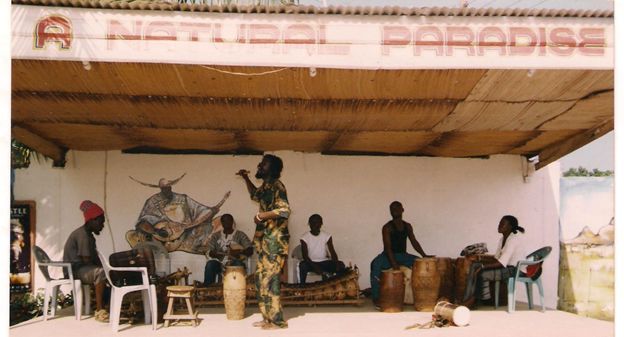Bakabri The Full Story
“It can be intimidating to hold a bamboo flute while surrounded by trumpets, saxophone and trombones, but you gain respect when you play and convince people what this instrument can do.“ the life of the blind musician and farmer – Boaten Kodua Akyeampong named “Bakabri“. He proved that African music with traditional African instruments can be played with the same success as the western pop-music, not only in Africa but all over the world.
Despite the fact that at that time the chance of success for blind people was very small, he faced the challenges and made his dreams come true.

Throughout his journey he made friends with famous African and American musicians, whom he played with at concerts over the years. In addition to his musical success, he also learned to grow mushrooms and building his own mushroom farm, gives impressions of the hard work, bravery and spirit of the blind farmer and musician Bakabri. It shows how music connects people from all over the world and how anyone can achieve wonders when believing in themselves.
I loved singing, teaching my friends any new song that I could learn from school, the church and traditional festivals. At Akuapem-Akropong school for the Blind, I joined the Akpasa group, a Ga-Adangbe folk musical troop, The art and culture group. I developed an interest in Crop cultivation, arts and music. I entered Wenchi secondary school in the then Brong-Ahafo region, ther I was enrolled into the school choir and later founded the liberty choir. with the vision of becoming a classical musician or scientist, but I completed secondary school in 1985 without progressing towards my goal because the means to achieve them were not available to a blind person in Ghana at that time. However, my skills as a singer and flutist improved and upon graduation from Wenchi SS, I received one of my most treasured Presents, the atenteben, a bamboo flute.
That was where I was introduced to the Atenteben Flute by my two music teachers in school; Mr Adjei Asare and Amoah. I received one as a gift when I completed Wenchi Secondary and I spent time developing my skills for the two years I stayed at home after my secondary education. In 1987 I visited Accra to find out how I could make good use of the skills acquired; I was holding my flute and walking around the Freedom and Justice Park at Kwame Nkroma circle when a young man who was holding Dondo drum came to me and introduced himself to me as Dan Banini. WhenI told himI was a flute player, he immediately said he should then take me to Nana Danso Abiam, founder and director of the Pan African Orchestra [PAO]. The PAO was just about starting and I was drafted into it as a Flutist and the archivist of the orchestra, documenting the day-to-day activities for future reference.
It was an eye-opening experience as I met other young persons eager to master a variety of African traditional musical instruments. During off-seasons for the PAO, I spent time practicing on my own and learning more about African instruments.
My friend and filmmaker, Kwate Nee-Owoo formed the Lako Edzeand Ntrama bands and I was able to fashion out more ideas about infusing African instruments and contemporary popular music with the bands. Nee-Owoo bought me my first Kalimba from Holand in 1991 and I followed the instructions on the manual to learn to play.
I was with the [PAO] from 1988 to 1998 and was part of the orchestra’s famous Opus 1 recording in 1994 in England. Over the years, I taught myself to play several traditional African musical instruments such as Kalimba, Wia, Seprewa and palm Drumming.
I took appointment with the National Theatre of Ghana in 1999 as a music instructor, composer and arranger for Indigenafrika, the youth group till 2005 when I resigned.
with the help of the Director of the West Africa Media Foundation, I formed Gonje, the only band in Ghana which performs with traditional African musical instruments.